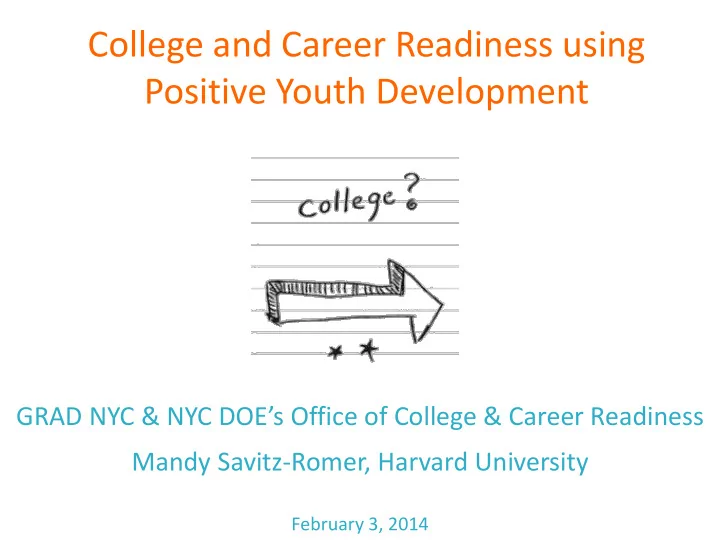

College and Career Readiness using Positive Youth Development GRAD NYC & NYC DOE’s Office of College & Career Readiness Mandy Savitz-Romer, Harvard University February 3, 2014
Landscape of College Readiness What matters Current priorities • Rigorous curriculum, • Academic policies; Common academic preparation, and Core Standards; Use of college academic skills placement exams in K12 • • Postsecondary aspirations, K-16 Improvements, college going cultures; school-university information, and awareness partnerships; advisories • Specific college planning • College preparation programs; and support community based services; • Financial aid, support and increased philanthropy literacy • Increased aid; FASA Completion efforts and policy changes
Gaps remain….. • Disengagement begins early • Lose students across the pipeline • Continued gaps in degree attainment • Current practices are not designed to reach ALL students
A developmental approach
Envisioning oneself as a college goer Marshaling internal Believing in the & external psychosocial ability to succeed resources Planning , organizing Aiming for goals and self regulating that matter A developmental approach
IDENTITY
A college-going identity
College-going identities Envisioning Believing Developing aspirations Developing expectations and goals that are that are based on beliefs consistent with other about one’s ability to go dimensions of one’s and succeed in college identity
Future oriented identity • How is one’s identity formed? • How do dimensions of identity fit together – or not? • How do students come to aspire to go to college?
College-going identities Envisioning Believing Developing aspirations Developing expectations and goals that are that are based on beliefs consistent with other about one’s ability to go dimensions of one’s and succeed in college identity
Self-efficacy • Belief in the ability to accomplish a specific task or goal AND to persist in the face of obstacles • Domain specific
What shapes self-efficacy? • Mastery of Experience • Vicarious Learning • Social Persuasion • Affect
MOTIVATION
“She’s just not that motivated …”
What is motivation? The beliefs and goals that drive action and the associated behaviors conducive to success and well-being
Motivation & Beliefs The reasons for pursuing college matter
Goal types Intrinsic Extrinsic • Performs task for • Performs task for the inherent interest or purpose of receiving enjoyment external rewards
Goal types (cont.) Extrinsic Intrinsic • Performs task for the • Performs task for purpose of receiving inherent interest or external rewards enjoyment Internalized regulation • Has internalized task’s value for long -term goal
A lesson from Cedric Jennings
“…there’s a difference between wanting to go to college and someone telling you they want you to go to college. Because when you go to college for reasons you don’t know why, then you drop out. Because you don’t know why you’re there. You’re going for someone else. It’s like a promise you’re keeping that’s not yours. It’s not your own promise.” Karen D. Arnold, Shezwae Fleming, Benjamin L. Castleman, Mario A. DeAnda, Katherine L. Wartman and Philip Price (2012)
Motivation and Beliefs: Beliefs about effort and success matter
Beliefs about Intelligence • Growth mindset: Intelligence is like a muscle; you can always build it • Fixed mindset: Intelligence is a set quantity; you have it or you don’t What influences these beliefs? * Messages about effort and ability * Feedback including praise for good performance
SELF-REGULATION
Envisioning oneself as a college goer Marshaling internal Believing in the & external psychosocial ability to succeed resources Planning , organizing Aiming for goals and self regulating that matter A developmental approach
self-regulation & college readiness
what is self-regulation? • Self Regulation : Ability to manage thoughts, emotions, behaviors in the service of attaining goals • Specific Set of Skills – Attention and focus – Cognitive flexibility/shifting – Planning – Organization – Reflection and reassessment – Delay of gratification
planning • Mental Contrasting • Multiple Pathways
Self-reflection and meta-cognition Performance Forethought Reflection Control
delay of gratification
Envisioning oneself as a college goer Marshaling internal Believing in the & external psychosocial ability to succeed resources Planning , organizing Aiming for goals and self regulating that matter A developmental approach
Questions
Recommend
More recommend